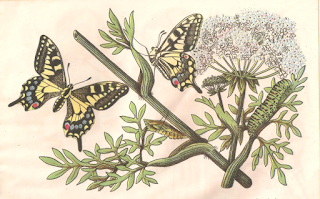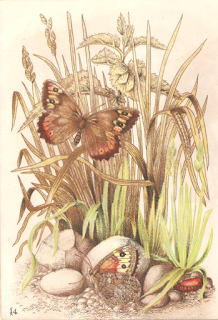The original Puffin series were produced during WWII despite the privations of that era, and their aim was to provide well illustrated educational literature that explained to children the natural world and built environment without talking down to them. Among the topics to be included were history, nature and geography, and all for the grand sum of sixpence!
Carrington looked to the great posters being produced by London Underground for illustrators to create imagery for the series, and decided that the most cost effective method of illustrating the titles was to use autolithography, which would involve the artists making their illustrations by drawing directly onto a zinc plate.
Pere Castor book illustration
This technique had been used by Soviet publishers to produce colourful books such as those in the Pere Castor series for Russian children, and was also used by artist Kathleen Hale to create the first of her highly successful Orlando The Marmalade Cat series for Puffin, which proved to be hugely successful.
The Puffin series went on to be so popular that their use moved from the home to educational material in schools and colleges across the country. Butterflies In Britain was illustrated by Richard Chopping (1917-2008), a very close friend of the painter Francis Bacon. Chopping studied drawing flora and fauna under Cedric Morris at the East Anglian School of Painting and Drawing, and as well as being an illustrator from 1942-1949, taught at the Royal College of Art from 1965. He considered himself more an author than an artist and did write several books for children and adults.
Chopping is probably most well known for his much admired classic dust-jacket illustrations for Ian Fleming's James Bond series. His style of illustration was colourful and almost trompe l'eoil and he was chosen to illustrate the Bond books by Fleming's wife. He enjoyed depicting natural objects like plants and insects wherever possible in his work, so it is no great stretch of the imagination to see why he would be chosen to illustrate Butterflies In Britain.
Chopping was only 25 years of age when when he was commissioned to both write and illustrate the Butterflies In Britain Puffin title having been introduced to Noel Carrington by Kathleen Hale.
Chopping's drawing style is so accurate and descriptive in evoking the plants and butterflies, and also very sensitive to the subject matter and the lithographic printmaking technique. The illustration above is really effective at showing the subtle textures and sharp lines which could be achieved with lithography. This illustration also demonstrates how rich and vivid the density of colours could be in the finished artwork with the litho-print technique.
Butterflies in Britain is quite rightly regarded as one of the best of the early Puffin series and Chopping went on to be commissioned to create the illustrations for a series on British Wild Flowers. Unfortunately this proved to be an undertaking which proved too time consuming and costly so the project was abandoned. Butterflies In Britain is though, a real testament to Chopping's skill as an artist, and displays his natural sensitivity to the subject matter. Copies can still be found fairly cheaply in second hand bookshops and of course the internet.















